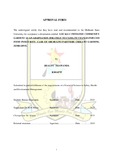Please use this identifier to cite or link to this item:
https://cris.library.msu.ac.zw//handle/11408/2150Full metadata record
| DC Field | Value | Language |
|---|---|---|
| dc.contributor.author | Dzawanda, Beauty | - |
| dc.date.accessioned | 2017-06-22T17:01:55Z | - |
| dc.date.available | 2017-06-22T17:01:55Z | - |
| dc.date.issued | 2015-11 | - |
| dc.identifier.uri | http://hdl.handle.net/11408/2150 | - |
| dc.description.abstract | This study assesses the sustainability of locally initiated community gardens as an adaptation strategy against climate change-induced food insecurity in Chikato ward 7 of Shurugwi district. Triangulation approach was employed in this study in which both qualitative and quantitative methods were used to collect data. Qualitative techniques included open-ended questionnaires, interviews, observations, focus group discussions and secondary data. Quantitative techniques comprised of close ended questionnaires and pre existing database from Shurugwi Partners. Analysis was done using Statistical Package for Social Scientists (SPSS), content analysis and Microsoft Excel. The study revealed that before Shurugwi Partners Community Gardens Initiative (SPCGI), the community of Chikato ward depended largely on rain fed agriculture which was, however, affected by effects of climate change such as low and unreliable rainfall. The introduction of community gardens brought with it changes into the Chikato community. There was an increase in vegetable diversity, nutrition changes, increase in income acquired from selling vegetables and production improved. Community gardens performed well in adapting to the effects of climate change by focusing on organic farming, traditional methods of dealing with pests and diseases and improving water security. Community gardens initiated by Shurugwi Partners are sustainable in enhancing food security as an adaptation strategy against climate change-induced food insecurity despite the withdrawal of assistance by the benefactor. The major reason for this is the overseer role which Shurugwi Partners continues to maintain after the decommissioning stage which is a characteristic unique to them as a locally headquartered Non GovernmentalOrganisation (NGO). Local leaders and key stakeholders exhibit a pivotal role as local pillars for sustainability of these community gardens through regular visits to community gardens solving any arising matters to ensure continuity of the project. The garden beneficiaries themselves are highly committed to the success of the community gardens and this has ensured high production and sustainability due to their commitment. The research recommends local leaders, Shurugwi Partners and garden beneficiaries to continue maintaining the roles which they play for the sustainability of community gardens.The beneficiaries should continue practising organic farming in community gardens to maintain the productive capacity of the soil without degrading the environment. This ensures sustainability of community gardens. The marketing committee should be vibrant in sourcing markets of vegetables because income is important for the procurement of diverse seeds. | en_US |
| dc.language.iso | en | en_US |
| dc.publisher | Midlands State University | en_US |
| dc.subject | Adaptation strategy, climate change-induced food insecurity | en_US |
| dc.title | Locally initiated community gardens as an adaptation strategy to climate change-induced food insecurity: case of Shurugwi Partners Chikato Gardens, Zimbabwe. | en_US |
| item.languageiso639-1 | en | - |
| item.fulltext | With Fulltext | - |
| item.grantfulltext | open | - |
| Appears in Collections: | Bsc Geography And Environmental Studies Honours Degree | |
Files in This Item:
| File | Description | Size | Format | |
|---|---|---|---|---|
| FINAL DRAFT MSHE.pdf | 3.66 MB | Adobe PDF |  View/Open |
Page view(s)
104
checked on Apr 5, 2025
Download(s)
100
checked on Apr 5, 2025
Google ScholarTM
Check
Items in MSUIR are protected by copyright, with all rights reserved, unless otherwise indicated.



